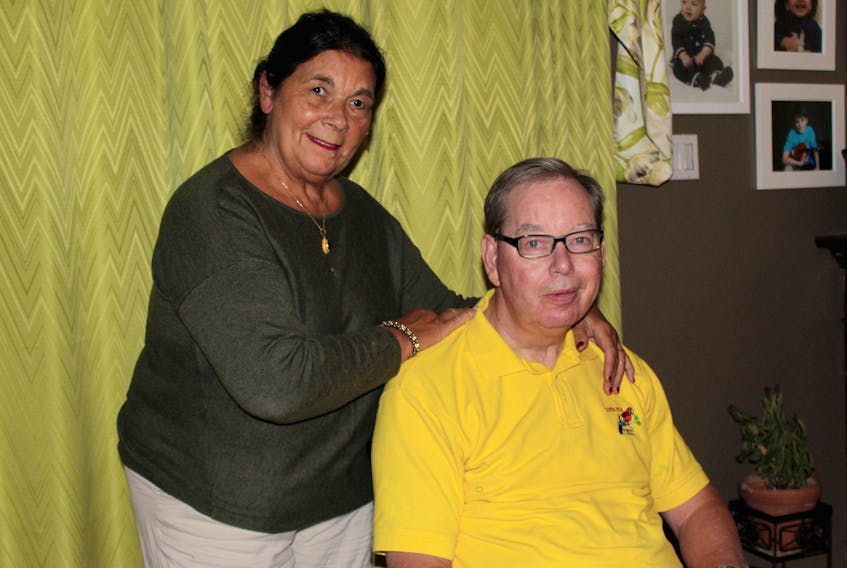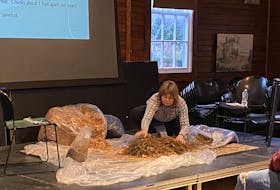CARBONEAR, N.L.
The walls of Rose and Gerald Andrews living room in their Carbonear home are filled with family photos and mementos of accomplishments.
The photos and awards are clear evidence of the importance of family, and the parental pride and encouragement as four children grew up.
Their neat bungalow is filled with fond memories.
However, the story is not completely cheery.
Twenty years ago, in October of 1998, life was turned upside down for the Andrews family.
Gerald suffered a brain hemorrhage.
The man who had spent years in the classroom — one year in the community college system, 18 years as a school teacher, and 10 years as a program coordinator in the secondary school system — was now in a hospital bed, fighting for his life.
Rose was half a world away at the time, visiting Sweden with a friend.
She recalls getting the call, telling her Gerald had been put on life support, and she needed to come back home to decide on the next step for his medical care.
“When I left for Sweden, my husband was in Clarke’s Beach building a building. When we got the phone call, we thought it was my friend’s father who had gotten sick. When I called and found out that it was actually my husband that was in ICU, right away I had all these questions: ‘Where is he? What happened? Is he going to be okay? Where is he on a scale of one to 10?’
“And the doctor’s reply was this: ‘Your husband is not on the scale. He’s on life support.’ I don’t remember anything else after that,” Rose said of the day her life changed completely.
However, she was not convinced this was the end of Gerald’s life, despite hearing suggestions from doctors to remove life support — a task they were delaying until Gerald’s wife was back in the province.
Rose, however, was determined that would not be the end of their story.
“When we got to the ICU, I went over and took my husband’s hand. I said to him, ‘My darling, I’m bringing you out of this, with your help.’”
She spent the next three weeks with Gerald in that hospital room.
Deep down, she says, she was certain her husband was not dead.
So they began to rewrite their life story — with a plot change that would dominate their lives over the next 20 years.
From the start, Rose says she was determined to improve her husband’s situation, by any means necessary.
At first, this began with things like reciting the alphabet as a means of rekindling Gerald’s most basic memories — a practice they continued for a number of years, slowly building up from the alphabet and moving on to words and phrases.
Rose says it was a slow process, but she continues to see progress in her husband, both mentally and physically.
“No matter how difficult it was at one point, seeing him here with me, and seeing him continuing to improve, is what drives us,” she said.
Gerald’s rehabilitation, Rose said, involved lots of repetition; showing and telling him things over and over.
“His intellect is all still there,” she said, and he continues to be an avid reader.
In 2006, with help from Rose and others, Gerald’s third edition of Heritage of a Newfoundland Outport; The Story of Port De Grave was re-printed, having originally been published in 1996 – two years prior to Gerald’s brain hemorrhage.
In the prologue at the end of the book, Ray Andrews writes not only of the value of the book, which tells in detail and a narrative writing style, the history of one of this province’s oldest communities, but of Gerald and Rose Andrews and their determination in the face of his illness.
“To all of us, they have been pure examples of what devotion, perseverance and determination can achieve,” Ray wrote.
The man who delved deep into the history of his home community, to write about it so eloquently, has some challenges today regarding memory.
“His long-term memory is still there, but it’s the short-term memory that he struggles with,” says his wife. “Tomorrow, he might not remember that we had a visit from The Compass today, but there are plenty of things that he can remember from years ago. That’s why I repeat things to him so often, so that it sticks around, and that’s what we’ve been doing for years.”
Physically, the illness also took a toll, confining Gerald to a wheelchair.
At the pool in Carbonear, with the water giving buoyancy for physiotherapy and Rose to help him, he gradually built up muscle strength.
Now he’s able to stand on his own, switch from his wheelchair to sofa with relative ease, and can even walk a little around the house with the aid of a walker.
For years, Rose was a stay-at-home mother to her children.
When they moved to Fredericton, N.B., where her husband was pursuing his Masters of Education (Technology) degree, she secured a job in long-term care.
When they returned to their home in Carbonear, she landed a job at the Harbour Lodge, and was employed there when Gerald suffered the brain hemorrhage.
She quit her job to take care of her husband.
“It’s funny when I hear people talk about how long of a shift they have coming up, now. Come spend a day in my shoes,” Rose said with a burst of laughter.
Rose admits, reflecting on those moments from 20 years ago, that the future was scary.
However, she realized that fear and worry would not help.
“Fear doesn’t last long when you’re faced with a situation you can’t control. You either buckle down and do what you have to do, or do nothing at all, and I wasn’t about to do nothing for my husband,” she said, the determination obvious in her voice, going on to note that the job was something like a roller coaster at times, with some days being rather difficult, while the next day could be the complete opposite.
“It’s about patience, at the end of the day,” she said.
As Rose tells their story, Gerald sits beside her, reading, moving his finger along the words to keep his place on the page.
When asked what he thought of the efforts it took to bring them to where they are today, Gerald pondered the question for a moment before slowly turning his head to gaze at his wife.
Slowly and with some effort — speech is still something Gerald struggles with — but with an obvious look of affection in his eyes, he replied, “She’s really something.”
***
Lobbying for accessible services
Rose and Gerald Andrews have certainly faced challenges in the past 20 years. While they have faced most of the challenges in stride, there have been some frustrations along the way.
One of those frustrations centers around accessibility.
Over the last 20-years, they’ve used local recreational facilities to aid Gerald’s rehabilitation.
They’ve been using the Carbonear pool since 2000 to help Gerald with his walking practice. The problem there, says Rose, is there is no change room dedicated for use by people who use wheelchairs.
Since Gerald requires help in switching into or out of his swimwear, the husband and wife would have to be in either the male or female change room together.
This ultimately posed a number of problems when other people were using the change room as well.
After one particular encounter with a pool patron, Rose became more intent in her fight for accessibility, specifically a changing room for differently abled swimmers.
“When the new council members came looking for my vote last year, I told them all the same thing; that they would be seeing a lot of me in and out of the council chambers until we have an accessible community,” she said.
Rose says she is starting to see progress.
Recently the town decided to apply to the federal government for a $150,000 grant to install a unisex changing room at the pool.
Rose wrote the letter of support, as a patron of the pool, to go along with the application.
She says it’s something that’s long overdue.
“Now, we’re waiting to see whether or not the application is successful. If it’s not successful? We’re going to continue this fight, no doubt about that,” Rose said, determination evident in her tone.
Accessible parking
The couple’s goals do not stop at just the pool, however.
Rose says she continues to fight for accessible parking and blue zones within the town.
More blue zones have been set up at the town hall parking lot in Carbonear, and she’d like to see blue zone parking spots installed along Water Street as well.
Currently, the Town of Carbonear is trying to determine the best location for these designated parking spots along its downtown sector.
“In this day and age, there’s no reason to not have accessibility in any means possible,” Rose said, noting that even tools such as portable wheelchair ramps can do wonders for local businesses that may not have the means of installing permanent ramps.
“It doesn’t stop here. We’re not going to stop fighting for accessibility, ever,” she emphasized. “We’re not the only ones in this situation, by any means; if buildings and facilities are not accessible . . . then that’s just not good enough in this day and age.”









